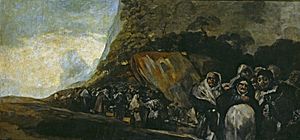Pilgrimage to the Fountain of San Isidro facts for kids
Quick facts for kids Pilgrimage to the Fountain of San Isidro |
|
|---|---|
| Spanish: Peregrinación a la fuente de San Isidro | |
 |
|
| Artist | Francisco Goya |
| Year | c. 1821–1823 |
| Medium | Oil on plaster wall transferred to canvas |
| Dimensions | 127 cm × 266 cm (50 in × 105 in) |
| Location | Museo del Prado, Madrid |
Pilgrimage to the Fountain of San Isidro is a famous painting by the Spanish artist Francisco Goya. It was created around 1821 to 1823. This artwork is a mural, which means it was painted directly onto a wall.
Goya painted this work, along with thirteen others, on the walls of his own house. These paintings are known as the Black Paintings. Later, between 1874 and 1878, these murals were carefully moved from the walls onto canvas. This difficult job was done by an art restorer named Salvador Martinez Cubells. Today, you can see this painting at the Museo del Prado in Madrid, Spain.
What the Painting Shows
Pilgrimage to the Fountain of San Isidro shows a group of people in a procession. A procession is like a parade or a march, often for a special event. In the painting, you can clearly see about eight main figures leading the way.
Details of the Scene
One person in the painting wears clothes from the 1600s and holds a glass. Another figure looks like a monk or a nun. The left side of the painting has a brighter sky, which makes it one of the lighter parts of Goya's Black Paintings. Most of these paintings use dark colors like browns, grays, and blacks.
Connecting to Other Artworks
Another of Goya's Black Paintings is called A Pilgrimage to San Isidro. This painting looks very similar to Pilgrimage to the Fountain of San Isidro, but it has a darker feel. Both paintings might show processions heading to the shrine of San Isidro. This shrine was very close to Goya's house, called Quinta del Sordo. Goya himself did not give these paintings their titles.
See also
 In Spanish: Peregrinación a la fuente de San Isidro para niños
In Spanish: Peregrinación a la fuente de San Isidro para niños
- List of works by Francisco Goya
 | May Edward Chinn |
 | Rebecca Cole |
 | Alexa Canady |
 | Dorothy Lavinia Brown |

